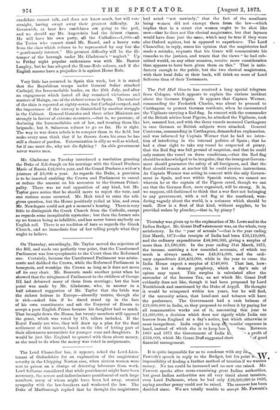The Lord Chancellor has, it appears, asked the Lord-Lieu- tenant
of Oxfordshire for an explanation of the magistrates' severity in the Chipping Norton case, when sixteen women were sent to prison on a charge of deterring labourers from work. Lord Selborne considered that while punishment might have been necessary, the severe and indiscriminate punishment of such large numbers, many of whom might have been led away, created sympathy with the law-breakers and weakened the law. The Duke of Marlborough replied that he thought the magistrates had acted "not unwisely," that the fact of the assailants being women did not exempt them from. the law—which implies that in a street riot women ought to be shot like men—that he does not like clerical magistrates, but that laymen would have done just the same, which may be true if they were also Oxford squires, but is opposed to experience. The Lord Chancellor, in reply, states his opinion that the magistrates had made a mistake, requests that his Grace will communicate his remarks to the justices, and trusts that the views " he had sub- mitted would, on any other occasion, receive more consideration than appears to have been given them on this." That is satis- factory enough to the public, but the two clerical magistrates, with their local duke at their back, will think no more of Lord Selborne than of their Testaments.






























 Previous page
Previous page